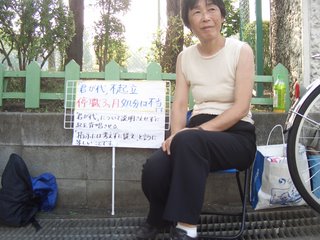 On June 29 1981, OKI sacked one of its workers who had refused to sign the choices he was offered, a transfer order to work far from his home or to a piece of paper that said he agreed to be fired.
On June 29 1981, OKI sacked one of its workers who had refused to sign the choices he was offered, a transfer order to work far from his home or to a piece of paper that said he agreed to be fired.On June 29 2006, 25 years later Tetsuro Tanaka, was forcefully evicted from the company's shareholders meeting. This violence against a shareholder who dared to ask a question was reported the following day in a Tokyo newspaper. A number of Japanese companies have been forced to appoligise to their stockhoders on matters of corruption and other violations of their legal responsibilities.
Tanaka has become famous around the world for his daily picket of the OKI factory where he worked in Takao. He sings songs he has composed about his struggle with the company. Late year he was awarded a Japanese human rights award in Tokyo for his determination and support for other workers who find themselves in similar situations, being unfairly dissmissed or being punished for standing up for themselves.
The German magazine Der Spiegel wrote about Tanaka this February and his story was picked up recently by a Turkish website but the best place to find out more is from his own website at http://www.din.or.jp/~okidentt/eigohome.htm
Congratulations on on the 25th anniversary!
 A few brave teachers have protested and are continually harased and punished by the authorites. One of the reasons they will not sing the anthem is because it is the World War 2 hymn "Kimigayo" that was used to glorify the Japanese Imperial Army as it invaded other Asian nations killing 19 million people. "Hinomaru" is the Japanese national flag and "Kimigayo" the Japanese national anthem. The stance of people on the Hinomaru-Kimigayo issue has become a touchstone question of democracy itself in Japan.
A few brave teachers have protested and are continually harased and punished by the authorites. One of the reasons they will not sing the anthem is because it is the World War 2 hymn "Kimigayo" that was used to glorify the Japanese Imperial Army as it invaded other Asian nations killing 19 million people. "Hinomaru" is the Japanese national flag and "Kimigayo" the Japanese national anthem. The stance of people on the Hinomaru-Kimigayo issue has become a touchstone question of democracy itself in Japan.
